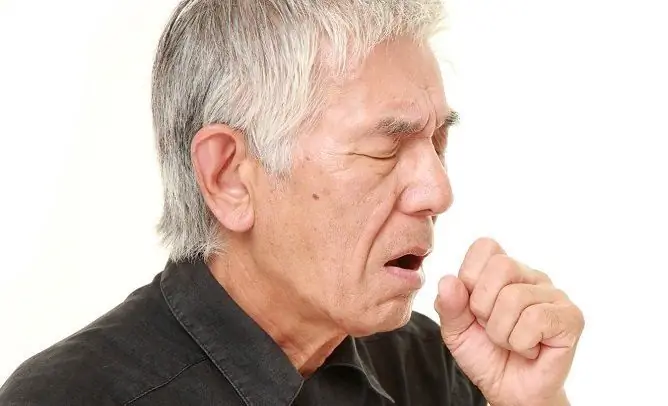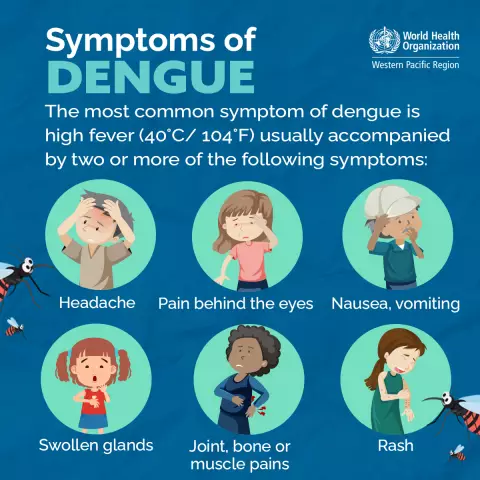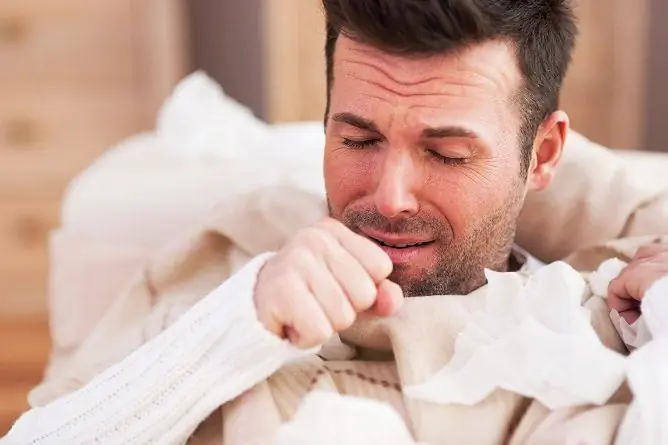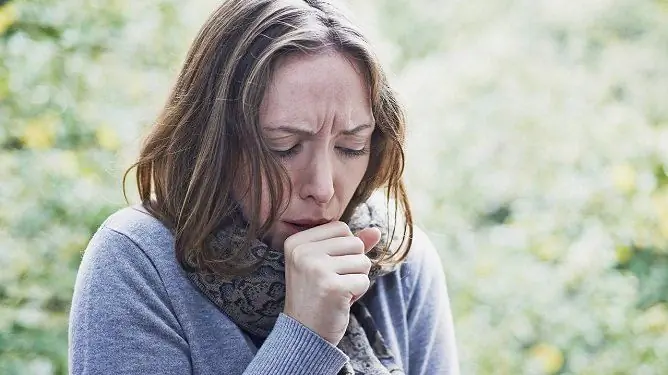- Author Rachel Wainwright wainwright@abchealthonline.com.
- Public 2024-01-15 19:51.
- Last modified 2025-11-02 20:14.
Cough without a cold in an adult: causes, treatment and accompanying signs
The content of the article:
- Why does a cough occur in the absence of a cold
- How does a cough of a non-cold etiology manifest
- How to treat a cough that occurs without a cold
- Video
The causes of a cough without a cold in an adult can be very different. Cough is one of the most common symptoms of diseases of the respiratory tract. In addition, this clinical sign can cause pathologies of other organs and systems of the human body.
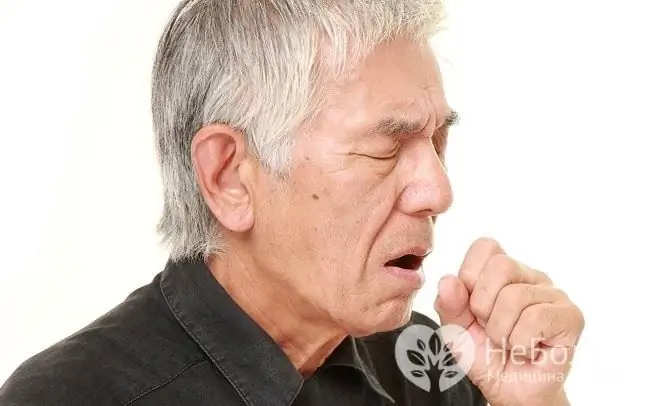
A cough is often not associated with a cold; there can be many reasons for it
A clinically healthy person (adult or child) normally may experience no more than 20 cough shocks per day. The cough can be dry or moist (unproductive or productive), depending on whether the patient is dropping sputum. It can also be acute (up to 3 weeks), protracted and chronic.
Why does a cough occur in the absence of a cold
If a person develops an unproductive cough in the absence of a cold, which is usually understood as ARVI, the reason for this may be:
- beginning laryngitis or bronchitis;
- allergic reaction;
- bronchial asthma;
- emphysema of the lungs;
- tuberculosis;
- malignant neoplasm of the respiratory tract;
- nervous tension, stressful situations, excessive excitement;
- inhalation of dust and / or chemical fumes;
- ingress of a foreign body into the respiratory tract;
- taking certain medications (in particular antihypertensive drugs);
- disorders of the gastrointestinal tract;
- a consequence of congestive heart failure;
- pleurisy;
- disorders of the endocrine system;
- whooping cough.
An unproductive cough can sometimes progress to a productive one.
A possible cause of a wet or productive cough is most often the presence of an inflammatory process in the respiratory tract, congestion in the bronchi (for example, advanced bronchitis, pneumonia, etc.), prolonged smoking.
How does a cough of a non-cold etiology manifest
In inflammatory diseases of the respiratory system, a cold cough may be the only symptom or be accompanied by discharge from the nasal cavity, nasal congestion, fever, sore throat and / or chest, difficulty breathing, etc.
With tuberculosis of the lungs, a person may be disturbed by a prolonged painful cough, which is aggravated in the morning. Blood impurities can be found in sputum. In the later stages of the development of the disease, hemoptysis is often observed.
With whooping cough, the patient usually has a paroxysmal barking cough, which is accompanied by weakness, an increase in body temperature to subfebrile values. Coughing fits often occur at night. In adults, the disease is usually milder than in children.
Allergic cough can occur directly upon contact with an allergen or some time after that. A cough with the development of an allergic reaction may be accompanied by:
- lacrimation;
- discharge from the nasal cavity;
- an itchy sensation in the nose and / or throat;
- sneezing;
- difficulty in nasal breathing;
- the appearance of a rash on the skin.
With bronchial asthma, coughing attacks occur, after which vitreous sputum can be separated. Patients may experience an attack of suffocation following a cough, pain in the lower chest, cyanosis of the skin. Also, patients with asthma complain of shortness of breath, tachycardia, wheezing. An attack of suffocation may be preceded by urticaria, runny nose, sneezing.
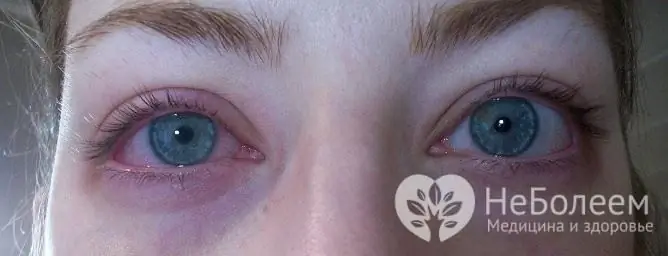
With allergies, cough is often accompanied by lacrimation, clear nasal discharge, itchy skin
With malignant neoplasms of the respiratory system, the cough is usually prolonged, an admixture of blood is found in the sputum. In some cases, the patients discharge purulent sputum, which is accompanied by an increase in body temperature, shortness of breath, and a deterioration in the patient's general condition. The patient has a decrease in body weight, a change in voice, weakness.
When a foreign body enters the respiratory tract, patients have an attack of severe coughing, suffocation.
With gastroesophageal reflux disease, coughing often occurs at night. He may be accompanied by:
- heartburn;
- sour belching;
- smell from the mouth;
- an unpleasant taste in the mouth;
- bloating;
- nausea and vomiting;
- constipation or diarrhea.
In patients who are taking certain antihypertensive drugs, in some cases, there is a constant coughing, which can occur both after the first use of the drug, and after long-term drug treatment. Other symptoms are usually absent.
In diseases of the cardiovascular system, cough may be accompanied by shortness of breath, tachycardia, pain in the heart.
A psychosomatic cough can occur in a patient with stress, severe anxiety and pass some time after the situation that caused his development.
The smoker's cough is worse in the morning. When a person coughs like this, a large amount of sputum is usually released. In addition, smokers may have frequent coughs throughout the day.
How to treat a cough that occurs without a cold
Table. Drugs that are often prescribed for a cold cough
| Drug groups | Description |
| Mucolytic agents | Liquefy phlegm, practically without increasing its amount, and improve mucus excretion |
| Expectorants | Improves the removal of bronchial secretions from the respiratory tract |
| Antitussives | Suppress the cough reflex, prescribed in the absence of mucus accumulations in the airways |
| Anti-infective drugs | Depending on the type of pathogen, antibiotics, antiviral, antimycotic drugs can be prescribed |
| Anti-inflammatory drugs | They have analgesic, antipyretic, anti-inflammatory effects, are prescribed for acute and chronic inflammatory processes |
| Antihistamines | Used for allergies |
For the treatment of bronchial asthma, the patient is prescribed bronchodilators, glucocorticosteroids, cromones, leukotriene receptor antagonists.
For whooping cough, patients may be shown the use of anticonvulsants. Patients are shown rest, fractional nutrition, massage, breathing exercises, physiotherapy may be required.
With a difficult cough and concomitant sore throat, gargling with a solution of sodium chloride is helpful. For this procedure, 0.5 teaspoon of salt is taken for 1 glass of warm water.
If a foreign object enters the respiratory tract, seek medical attention immediately. When this problem occurs, hospitalization of the patient is usually required. Removal of a foreign body from the respiratory tract may require surgery. The method of operation is selected depending on the size and location of the object, the age of the person, etc.
Patients who are taking medicines to correct blood pressure, if it is impossible to cancel or replace the drug, are advised to stop smoking and eat right.
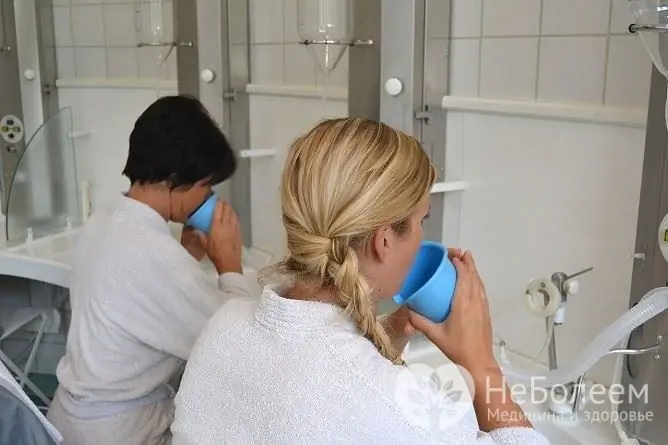
Some types of cough can be successfully treated with inhalation
Inhalation is good for some types of cough. It is best to carry out them with a nebulizer. For inhalations, solutions of medicines, sodium chloride, soda, alkaline mineral water can be used. They should be used only after consulting a doctor.
To relieve a patient's condition with a cough can:
- to give up smoking;
- humidification of the air in the room where the patient is;
- regular wet cleaning of the house;
- avoiding hypothermia of the body;
- plentiful drinking regime;
- healthy lifestyle.
These measures may be enough to stop coughing.
Video
We offer for viewing a video on the topic of the article.

Anna Aksenova Medical journalist About the author
Education: 2004-2007 "First Kiev Medical College" specialty "Laboratory Diagnostics".
Found a mistake in the text? Select it and press Ctrl + Enter.

